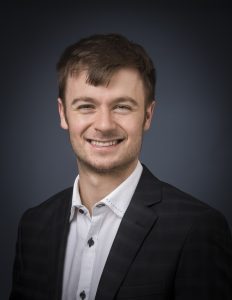
Dr. Benjamin Davidson – University of Toronto
Scientific publication
Benjamin Davidson, Clement Hamani, Jennifer S. Rabin, Maged Goubran, Ying Meng, Yuexi Huang, Anusha Baskaran, Sachie Sharma, Miracle Ozzoude, Margaret Anne Richter, Anthony Levitt, Peter Giacobbe, Kullervo Hynynen & Nir Lipsman. Magnetic resonance-guided focused ultrasound capsulotomy for refractory obsessive compulsive disorder and major depressive disorder: clinical and imaging results from two phase I trials. Molecular Psychiatry 2020;25:1946-57.
Using a new method to perform brain surgery without incision for treatment resistant Major Depressive Disorder and Obsessive-Compulsive Disorder.
Up to 30% of patients with major depressive disorder (MDD) or obsessive-compulsive disorder (OCD) are treatment resistant, not improving despite several courses of pharmacotherapy and counselling. After all other treatment routes are considered, and in the most severe cases, these patients may benefit from a surgical procedure known as anterior capsulotomy, in which a small lesion is created in the brain, in the limbic circuitry. Despite being safe, performing anterior capsulotomy with open surgery is considered invasive. In this study, Dr. Benjamin Davidson and colleagues demonstrated for the first time that patients with severe, treatment resistant MDD and OCD can be safely treated using a novel, incisionless modality, known as focused ultrasound. Focused ultrasound (FUS) is a new technology in which ultrasound waves are focused through the skull, allowing neurosurgeons to perform surgery without incision.
In the largest clinical trial in a cohort with severe refractory MDD or OCD to date, FUS-capsulotomy was demonstrated to be both safe, and efficacious. Twelve patients underwent FUS-capsulotomy, and six of these twelve showed significant improvement when tested 6 and 12 months after the operation. No patients experienced any deterioration or serious adverse effect, showing the approach to be safe. Moreover, the researchers were able to identify brain characteristics in patients pre-operation that could predict whether the patients would respond to this treatment. This preoperative predictor of response may in the future help select patients most likely to respond.
While the response rate of 50% demonstrated here is in line with what researchers anticipated from historical literature, they hope to increase this rate in the future using neuroimaging-based subject selection.
As a result of this study, numerous other centers have now begun performing this procedure across North America and beyond (including many whom have contacted the group led by Dr. Nir Lipsman for advice) and the University of Toronto neuromodulation center is now receiving referrals from regions throughout Canada.
Dr. Benjamin Davidson
Dr. Benjamin Davidson is a physician (neurosurgery resident) who has taken extended time out from his clinical work to pursue a PhD in surgical neuromodulation in the laboratory of Dr. Nir Lipsman and Dr. Clement Hamani at the University of Toronto. He lead this study, including, patient-recruitment, treatment, clinical and neuroimaging analysis, and writing. His supervisors, Nir Lipsman and Clement Hamani, assembled an excellent and collaborative team with whom he had the benefit of working, and whose mentorship was invaluable. As a physician, Dr. Davidson was well equipped to lead this multidisciplinary team, which included neurosurgeons, psychiatrists, neurologists, psychologists, and neuroimaging analysts.
Based on this study, Dr. Benjamin Davidson has given countless talks, and at the 2020 Focused Ultrasound Symposium (held virtually this year), he was awarded the Young Investigator’s Award, and delivered a keynote lecture.
Funding sources
This study was funded by the Focused Ultrasound Foundation, the Harquail Centre for Neuromodulation, and philanthropic support to the Sunnybrook Foundation
